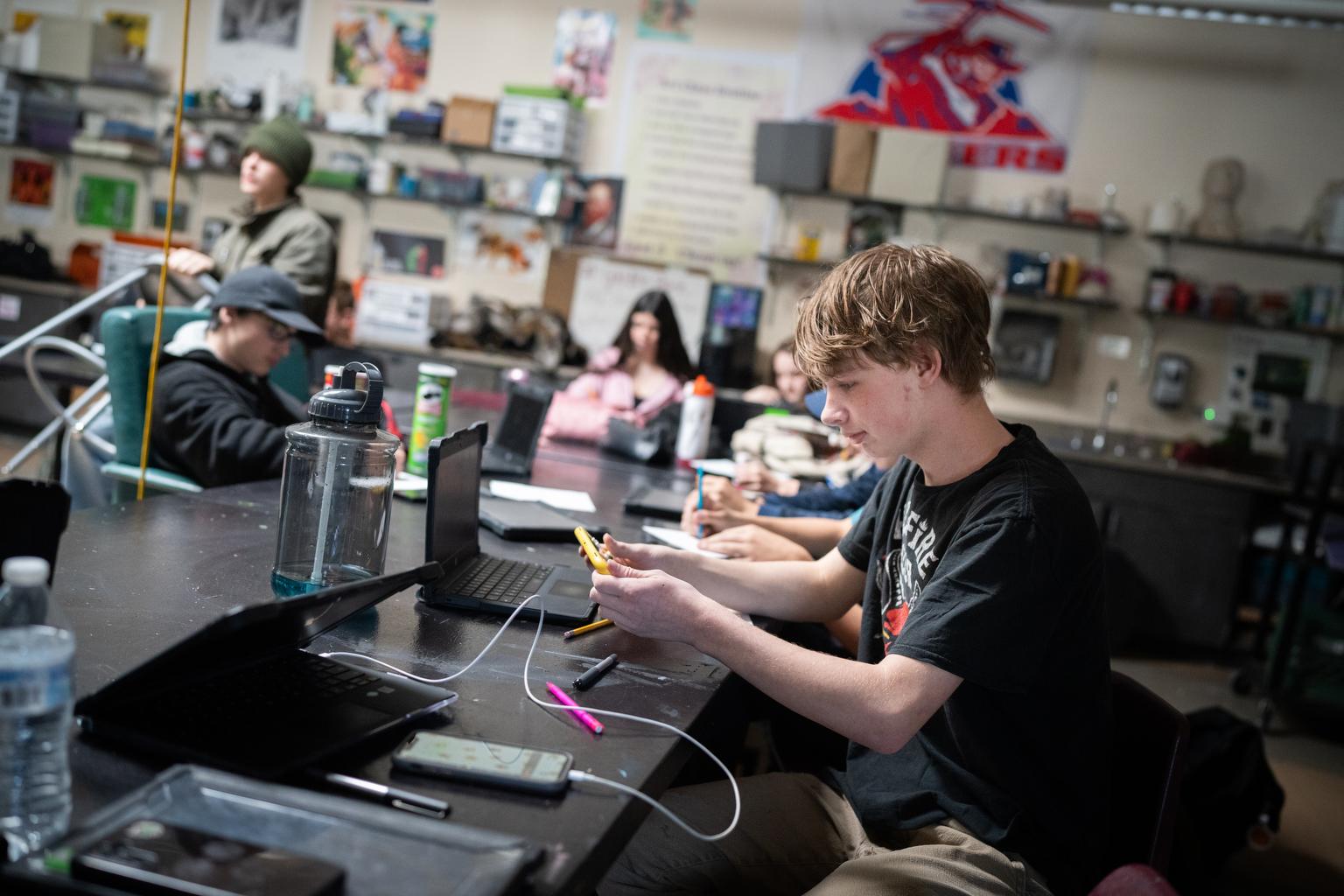
Angel Dettenreider stood in front of her tenth grade English class.“Take your phones, put ‘em away, I don’t want to see them,” Dettenreider called out to the students. “We have a guest here.”
She was referring to me, on the cold day this past December when I visited her classroom.
“Do not be disrespectful like you are to me every day on your phones,” she joked, then lowered her voice and said, “That’s changing.”
Dettenreider teaches at the rural Cripple Creek-Victor Jr./Sr. High School, and on this day, the kids were ready to explain their opposition to a proposed school-wide ban on cellphones in class.
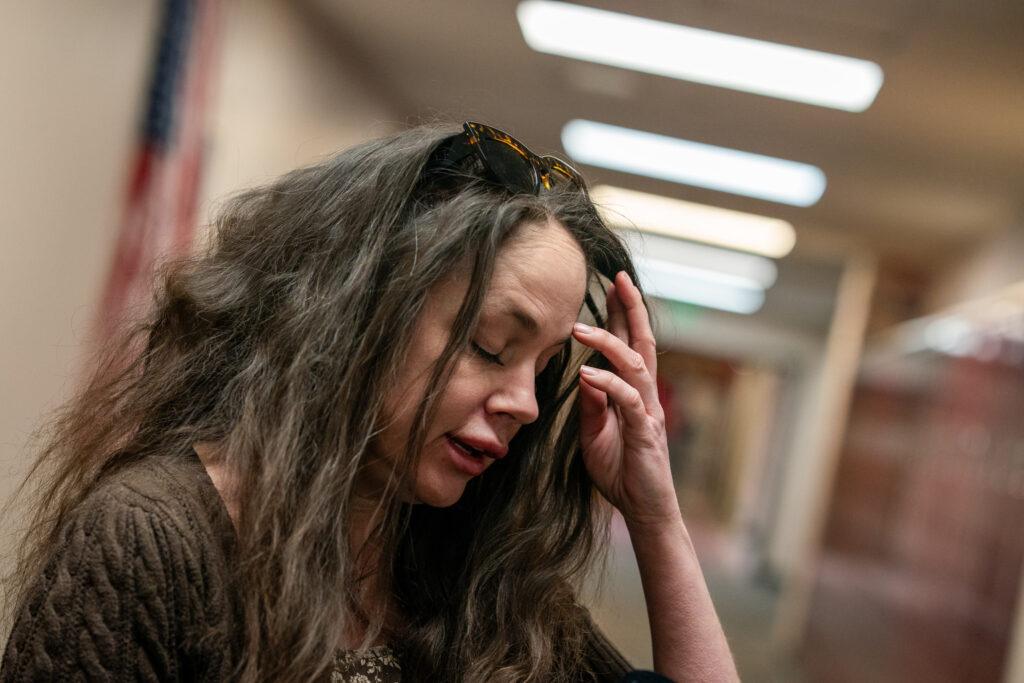
The kids were feisty. They argued vehemently that when they had finished their school work, the next best thing to do was pick up their phones. They are the go-to thing to stare at or send a message, the students said.
“She texts her boyfriend,” said one girl pointing at her friend. They said they played the video game Block Blast or Fortnite or watched Tiktok. A student named Josh said he’d like teachers to incorporate phones into lessons.
They argued they needed their phones for communication with family members and employers, and the students said the phone provides security – both physical and mental.
“I feel more safe, if anything happens, I could just, like, text someone,” said a student named Madison. CPR News does not use children’s last names in news stories.
As school districts across Colorado and state lawmakers wrestle with how and whether to regulate phone use, tenth and twelfth graders in Cripple Creek provided an up-close look into life just before and just after their school enacted a ban on phones in classrooms in January.
They also explained their relationships to cell phones in ways that adults of past generations often don’t fully understand. To these students, a phone is even more than an appendage to their bodies; it’s become a piece of the core of who they are.
But once the ban took effect, the students’ reactions surprised even themselves.
The Cripple Creek school enacted the ban after trying a piecemeal approach that was not working
In December, the phone caddy in Dettenreider’s classroom, where students were supposed to place their phones, sat empty. The kids didn’t use it. At the time, it was up to every teacher at the school to set their own policy, and Dettenreider said she had been fighting the monitoring battle for three months.
“If they don’t want us on our phones, they should enforce it more,” Josh said. Andrea, another student, added that if a “student doesn't want to (put away their phone), the teacher should just be fine with that and teach the other people who actually want to learn.”
But Dettenreider had had enough.
“When you do it all day with 150 kids, it’s exhausting. And teaching is exhausting enough,” she said.
The principal, Daniel Cummings, supported tightening the rules. “I am an adult male and I'm mature and I'm thoughtful and I find myself distracted by my phone,” he said. “We’re not saying cell phones are evil, we're saying in a classroom where we have a particular goal, that cell phones are not going to help us achieve that goal.”
The school decided it would require students to keep their cell phones in their backpacks and not out in class. To prepare, students in their advisory or homeroom classes had lessons in why the school was doing it.
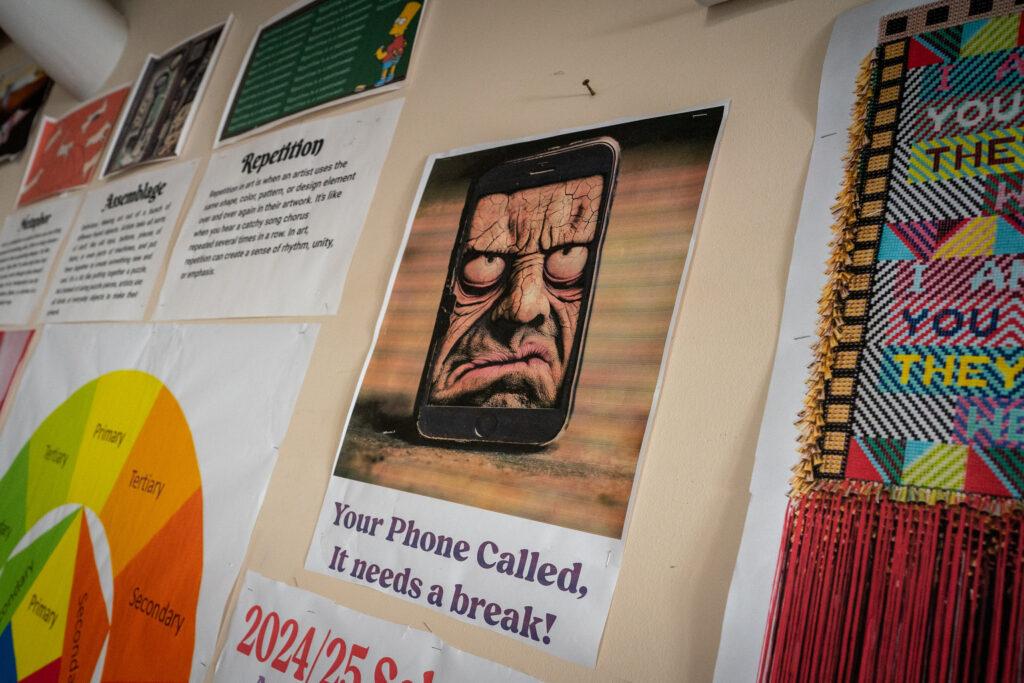
A newsletter also went home to parents with links to research studies on the detrimental impacts of phones on youth. A new paper in JAMA Pediatrics revealed that teens are on their phones for a quarter of the school day. A growing body of research shows students are distracted by text messages, social media and games during class.
Research also shows cell phones contribute to bullying, increased anxiety and stress, and a decrease in self-esteem. And phones inhibit in-person social interaction.
But some Cripple Creek students said they saw hypocrisy in the new policy.
“If you’re going to take it away from us you’re going to have to take it away from the teachers, otherwise the students are going to get pissy,” said Atreyu.
The whole class began talking. They were fired up and feisty. Josh perceived that everyone was going to be punished for a problem that not all of them had.
For kids who had demonstrated they had a real problem paying attention, he said, “Why don’t they set something up with their parents where they don’t bring their phone to school?”
Students feared without their phones, they would lose something that calmed them and provided security
Another concern around the ban was how it would affect kids who are highly sensitive and get overstimulated.
“I kind of have an emotional problem and autism,” said Jaxon. “I’m just very sensitive to stuff emotionally. When I listen to music, it kind of helps calm down as long as whatever’s enraging me doesn’t keep enraging me.” On his playlist in December were songs like Untraveled Road by Thousand Foot Krutch.
Other students described how the phone provided physical and mental security.
“I have a super close-knit family so being able to text them is a major part of my life,” said Abigail.
This need to be in constant contact with their families can be baffling to adults who grew up long before cell phones. Facing the students, I told them, “In my generation, we didn't even think about our parents at school,” explaining that it was a different time when youth tried to separate themselves from their parents as much as possible.
But in this modern classroom, that idea was unthinkable. Some students looked baffled.
“I just think about my mom because I love my mom,” a tenth grader named Lilly said. “And I like to text my mom throughout the day. She’s my little best friend.”
I felt like calling my mom.
Cummings, the principal, suggested the students could go to the front office to call their parents.
“If we have to contact our parents, we’d have to walk all the way up to the office and use the phone, but there’s going to be a lot of people doing that,” said Madison. She and the other students didn’t like the idea that if a parent called the office, they would have to make an announcement and students would have to trudge to the office for a message.
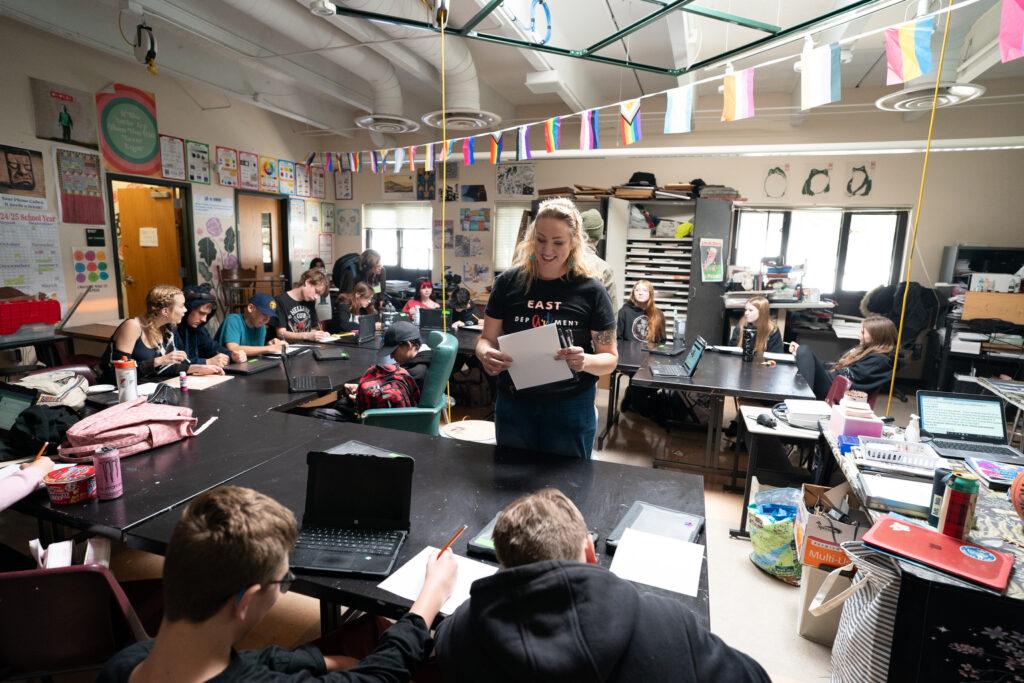
To be clear, Cummings said a poll showed the school was evenly split on the new policy
“I was surprised that it was fairly even between students who were like, ‘I will never give up my phone’ and students who are like, ‘Please take the phones because they are distracting.” The twelfth graders were way more chill about it, Cummings said.
“I don’t really care because I really don’t use my phone much,” said a student named Cole.
A group of twelfth-grade girls didn’t seem too bothered, either.
“For me I rarely take out my phone during class unless I’m done with a project or I check it real quick and I put it away,” said Malia.
But even students who were not opposed to a ban described how phones were part of their personal identities, part of the essence of who they are. Malia said, “I don’t know how you’re going to ban something we grew up with.”
The kids resent the implication that they are addicted. They say everyone is addicted, with family members scrolling at the dinner table.
“It's a whole country addiction at this point,” Josh said. “If you look at any person in America, it's gonna be very rare that you find somebody who still enjoys to just go outside. They more prefer to see the world through their phones.”
Dettenreider stayed silent while her students mounted a fierce attack against the phone ban. She interjected just once. She said she has never denied a student using earbuds to listen to music.
“They are allowed to use earbuds if it helps calm them down and helps them work better,” she said.
Under the school’s new policy, students with disabilities and students who rely on their phones for healthcare needs or learning purposes will be accommodated.
But she worried that some students were not at the reading level they should be, and cell phones have interfered with their progress. The majority of teachers in Colorado feel the same way.
“Most of the kids that are failing, it’s because they're on their phones nonstop,” Dettenreider said.
The Cripple Creek school’s phone ban took effect in January
In late February, Cummings said it has been carried out pretty much as he expected. A majority of students accepted it, and teachers have reported that they are not seeing many cell phones during classes.
He said there have been a few instances when students have pushed back against the ban, but not many. Cummings estimates about three or four phones have been collected and sent to the front office for holding.
Students have a more nuanced take on how things are going. Some students said they don’t think the ban has changed them much. Others acknowledged it was a little hard at first.
“If I feel a notification, my whole body reacts like I need to grab it,” said Madison.
Lilly, the student who texted her mom every day, said it’s been difficult.
“But I just text on my watch,” she added.
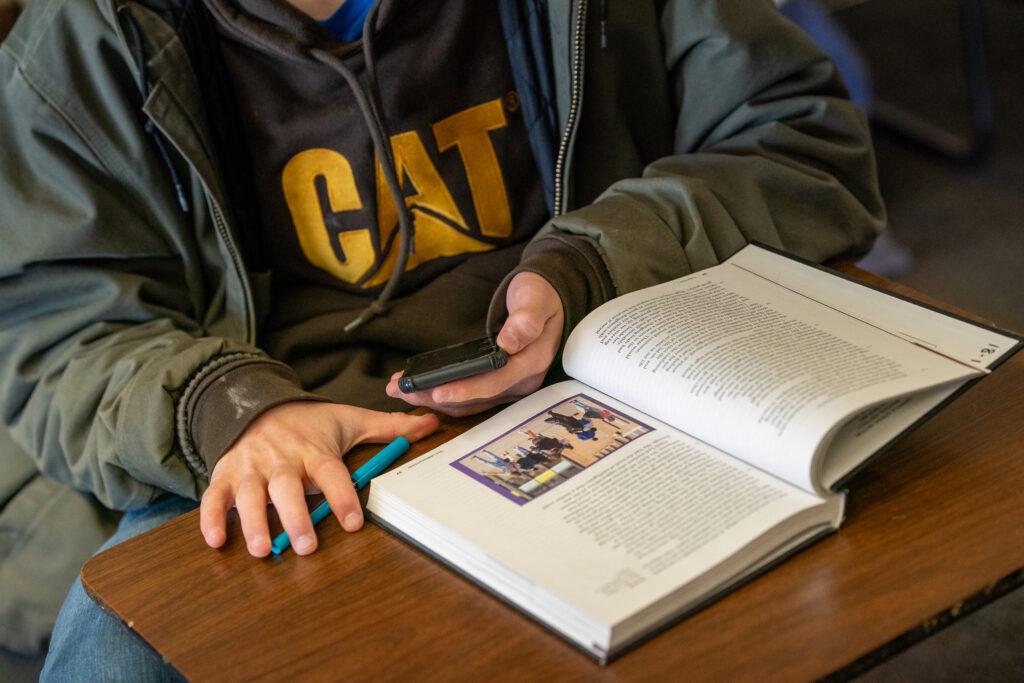
Abigail said teachers have been getting irritated about the smartwatches.
“In their eyes, it's a mini phone when in reality watches can be used to track your steps, your health, your blood pressure … with the benefit of being able to text from it.”
Abigail said some students have learned to alter when they text, saving it up for the lunch break or during advisory time.
Students described how some teachers have been stricter than others: A phone out in math class was most likely to get taken away. In another class, a teacher trusted some students to put phones on their desks.
Counselor Sadie Miller acknowledged in some classes, a happy medium has been struck.
“If you're not actively on it, we're OK. Right now, this is kind of like a compromise, meeting in the middle,” she said, adding that the policy may evolve next school year.
Miller said the biggest pushback has been wanting to listen to music, so the school bought headphones and earbuds to plug into the school Chromebooks.
“They have seemed to really understand the ‘code-switching’ of when phones are okay and when they are not, which is a life skill that we have been teaching to our students,” Miller said.
Miller looks to the school’s middle-grade students for what may happen next. For them, a phone ban has been in place since the beginning of the school year. She’s noticed a lot of positive impacts: The students talk to one another more. They’ve learned to play board games and play cards when they’re bored. And to leave Mom alone.









